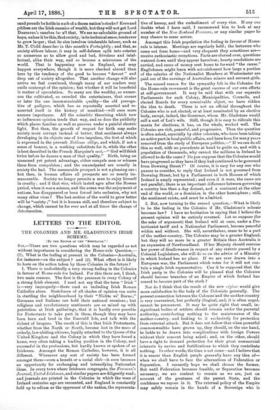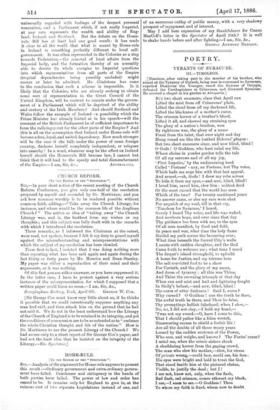LETTERS TO THE EDITOR.
THE COLONIES AND MR. GLADSTONE'S IRISH SCHEME.
[TO THE EDITOR OP THE " SpEcrAToa.- I
Sia,—There are two questions which may be regarded as not without importance in considering the Home-rule Question,— 41), What is the feeling at present in the Colonies—Australia, for instance—on the subject P and (2), What effect is it likely to have on the action taken by those Colonies in the future ?
1. There is undoubtedly a very strong feeling in the Colonies
in favour of Hume-rule for Ireland. For this there are, I think, two main reasons. The first is the presence in every Colony of a strong Irish element. I need not say that the term " Irish " is—very improperly—there used as including Irish Roman Catholics alone. Scotchmen of all shades of opinion can unite in startling the neighbourhood by their "Nichts wi' Burns ;" Germans and Italians can hold their national reunions ; but religious and revolutionary sentiments are so mixed up with patriotism at Irish gatherings, that it is hardly ever possible for Protestants to take part in them, though they may have been born and bred in the Emerald Isle, and talk with the richest of brogues. The result of this is that Irish Protestants, whether from the North or South, become lost in the mass of orderly, law-abiding citizens, loyally attached to the Queen of the United Kingdom and the Colony in which they have found a home, very often taking a leading position in the Colony, and successful in the professions, but hardly known or spoken of as Irishmen. Amongst the Roman Catholics, however, it is all .different Whenever any sort of society has been formed amongst them—even a benefit or a social club—it soon becomes an opportunity for exchanging and intensifying Nationalist ideas. In every town where Irishmen congregate, the Freeman's Journal, United Irishman, and similar papers are diligently read; and journals are printed in the Colonies in which the woes of Ireland centuries ago are recounted, and England is constantly held up to odium as the oppressor of the nation, the representa- tive of heresy, and the embodiment of every vice. If any one doubts what I have said, I recommend him to look at any number of the New Zealand Freeman, or any similar paper he may chance to come across.
Amongst this Irish population the feeling in favour of Home- rule is intense. Meetings are regularly held ; the lecturers who come out from home—and very eloquent they sometimes are— receive enthusiastic receptions. Facts are slurred over, questions watered down until they appear harmless ; hearty resolutions are carried, and sums of money sent home to forward " the cause." Englishmen might learn with astonishment how large a portion of the salaries of the Nationalist Members at Westminster are paid out of the earnings of Australian miners and servant-girls.
The second reason for the sympathy felt in the Colonies for the Home-rule movement is the great success of our own efforts at self-government. It may be said that with our separate Parliaments for each Colony, Municipalities, Councils, and elected Boards for every conceivable object, we have ridden the idea to death. There is not an official throughout the Colonies who is not elected, or at least nominated by an elective body, except, indeed, the Governor, whom Mr. Gladstone would call a sort of Lot's wife. Still, though it is easy to ridicule this mania for elections, it has, on the whole, worked well. The Colonies are rich, peaceful, and progressive. Then the question is often asked, especially by older colonists, who have been taking an active part in local public affairs, and have been for many years removed from the study of European politics,—" If we can do all this so well, with no precedents at hand to guide us, and with a population of thousands, why cannot the millions in Ireland be allowed to do the same P Do you suppose that the Colonies would have progressed as they have if they had continued to be governed from Downing Street ?" Of course, it is easy for any one who pauses to consider, to reply that Ireland is not governed from Downing Street, but by a Parliament in both Houses of which Ireland is amply represented ; and even if it were, the cases are not parallel ; there is an important difference between governing a country less than a day distant, and a continent at the other end of the world, or a dominion in the other hemisphere ; still, the sentiment exists, and must be admitted.
2. But, now turning to the second question,—What is likely to be the feeling in the Colonies if Mr. Gladstone's scheme becomes law? I have no hesitation in saying that I believe the present opinion will be entirely reversed. Let us suppose (for the sake of argument) that Ireland will at once, under a Pro- tectionist tariff and a Nationalist Parliament, become peaceful within and without. She will, nevertheless, cease to be a part of the mother-country. The Colonies may be a greater England, but they will no more be a greater Britain than Australia is an expansion of Newfoundland. If her Majesty should exercise her power of disallowance in respect of any statute passed by a Colonial Legislature, she will do so on the advice of a Ministry in which Ireland has no place. If we are ever drawn into a European war, the Parliament which votes for it will not con- tain a single Irish representative. Can it be supposed that the Irish party in the Colonies will be pleased that the Colonies should become branches of an Empire of which Ireland has ceased to become part of the stock ?
Nor do I think that the result of the new regime would give more satisfaction to the body of the Colonists generally. The present connection between the Colonies and the mother-country is very convenient, but perfectly illogical, and, it is often urged,
cannot be permanent. It may be quite right that small, in- significant bodies of settlers should remain under the parental authority, contributing nothing to the maintenance of the mother-country, and looking to it exclusively for protection from external attack. But it does not follow that when powerful commonwealths have grown up, they should, on the one hand, be liable to be drawn into complications with foreign Powers without their consent being asked ; and, on the other, should have a right to demand protection for their great commercial
interests by navies and fortifications to which they contribute nothing. In other words, the time must come—and I believe that it is nearer than English people generally have any idea of—
when we shall have to face the alternatives of Federation or Separation. I earnestly hope we shall choose the former.
But until Federation becomes feasible, or Separation becomes necessary, we are content to remain as we are, just on account of the greatness of the parent State, and the confidence we repose in it. The external policy of the Empire may safely remain in the hands of a Sovereign who is universally regarded with feelings of the deepest personal veneration, and a Parliament which, if not really Imperial, at any rate represents the wealth and ability of Eng- land, Ireland, and Scotland. But the debate on the Home- rule Bill has at least had one good result : it has made it clear to all the world that what is meant by Home-rule in Ireland is something perfectly different to local self- government. It was often represented in the Colonies as a step towards Federation,—the removal of local affairs from the Imperial body, and the formation thereby of an assembly able to devote its whole energies to Imperial questions into which representatives from all parts of the Empire (tropical dependencies being possibly excluded) might sooner or later be admitted. Mr. .Gladstone has come to the conclusion that such a scheme is impossible. Is it likely that the Colonies, who are already seeking to obtain some sort of representation in the Great Council of the United Kingdom, will be content to remain under the govern- ment of a Parliament which will be deprived of the ability and oratory of the Irish Members ? And should Scotland and Wales follow the example of Ireland—a possibility which the Prime Minister has already hinted at in his speech—will the remnant of the British Parliament be of sufficient importance to form the rallying-point for the other parts of the Empire P And this is all on the assumption that Ireland under Home-rule will become a free, loyal, and united dependency. How much stronger will be the case if she falls under the power of some foreign country, declares herself completely independent, or relapses into anarchy ! In a word, whatever may be the effect on Ireland herself should the Home-rale Bill become law, I cannot but think that it will lead to the speedy and total dismemberment
of the Empire.—I am, Sir, &c., AUSTRALASIA.



































 Previous page
Previous page